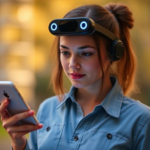Your basket is currently empty!

Privacy Concerns with Smart Gadgets
Smart gadgets make life easier—but they also raise serious privacy concerns. From smart speakers to fitness trackers, these devices often collect data about where we are, what we do, and even what we say. The more connected our gadgets become, the more vulnerable our personal lives can be.
One major concern is constant data collection. Many smart devices are “always listening” or tracking behavior. For example, a smart assistant might store voice recordings, while a fitness tracker logs your heart rate, sleep habits, and GPS movements. This data can be used to improve services—but it can also be shared with advertisers, third parties, or even governments.
Smart home devices are especially risky. Cameras, doorbells, and baby monitors that are connected to the internet can be hacked, leading to terrifying privacy breaches. In some cases, strangers have gained access to live video feeds or spoken through smart speakers.
Even seemingly harmless data—like thermostat settings or light usage—can be analyzed to determine your routines, when you’re home, or when you’re away.
Tech companies claim they protect user data, but data breaches, unclear privacy policies, and lack of transparency have made many people skeptical. And when multiple devices are linked through cloud services, one weak link can expose an entire network.
To protect privacy, users should read privacy policies, disable unnecessary features, update firmware regularly, and avoid connecting every gadget to the internet unless it’s essential.
In the end, smart gadgets should be just that—smart enough to serve you without spying on you. Privacy must be treated not as an option, but a core feature.





